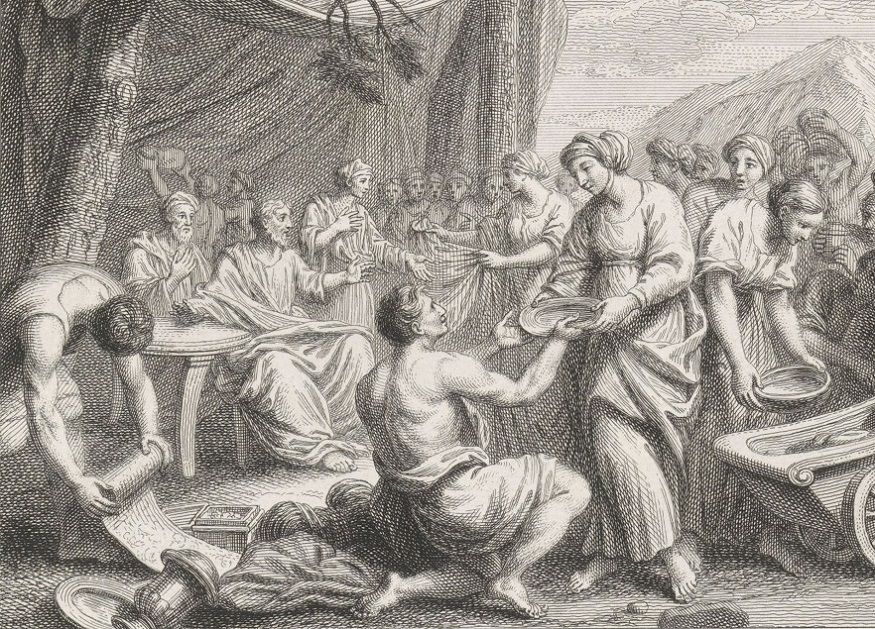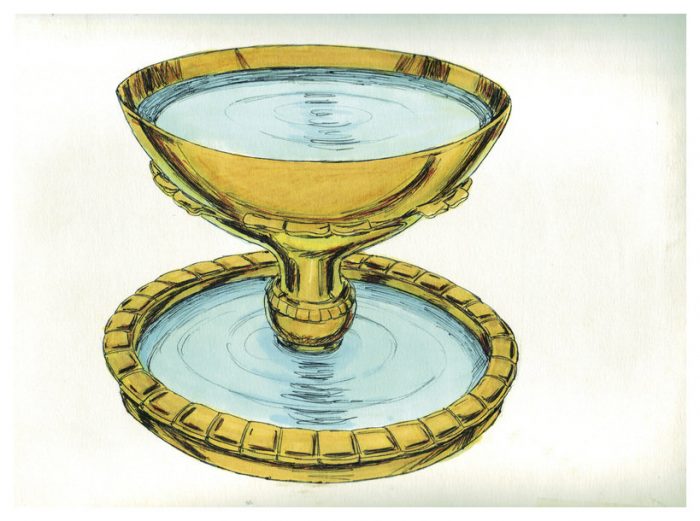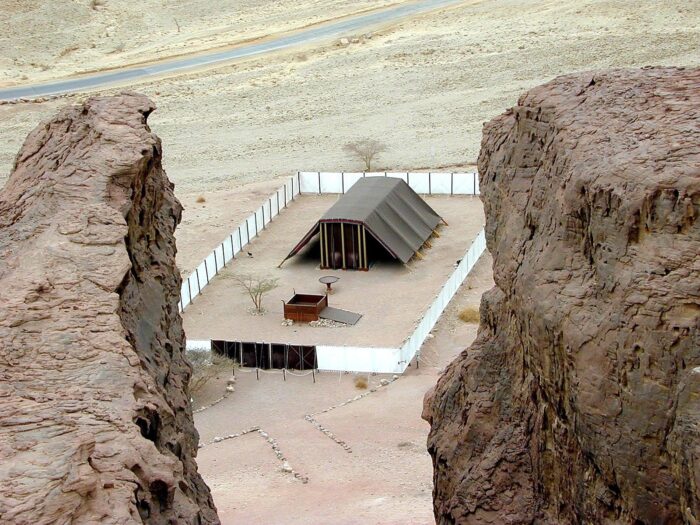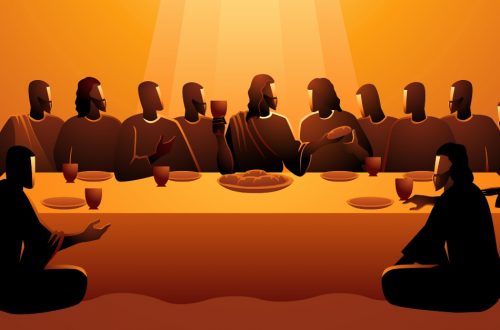
The Tabernacle of Moses – God’s Heavenly Pattern for our Spiritual Transformation – Part VIII: The Women of the Tabernacle
After the Tent of Meeting was built, women were designated to serve at its entrance. There is minimal mention of these Tabernacle Women in scripture save for two scripture verses and possibly a third, fourth, and fifth.
The First Biblical Reference for the Women of the Tabernacle

He made the large basin of bronze and its pedestal of bronze from the mirrors of the women who served at the entrance of the tent of meeting. (Exodus 38:8 NET)
And he made the laver of brass, and the base thereof of brass, of the mirrors of the serving women that did service at the door of the tent of meeting. (Exodus 38:8 OJPS)
How were these women chosen, and what exactly did they do? Apparently, this was common knowledge that Moses and his audience shared that was misplaced over the years.
It can be inferred from the text that the first group of women was chosen from those who donated their mirrors for constructing the Bronze Laver (1). Others may have volunteered or were paid with a portion of the sacrifices. Also, others were conscripted into Tabernacle Service from people groups that the nation of Israel conquered. (2)
The people [virgin girls (Numbers 31:7;31:14-18)] were 16,000, of which the Lord’s tribute was 32 people [virgin girls]. So Moses gave the tribute, which was the Lord’s raised offering, to Eleazar the priest, as the Lord commanded Moses. From the Israelites’ half-share that Moses had separated from the fighting men,there were 337,500 sheep from the portion belonging to the community, 36,000 cattle, 30,500 donkeys, and 16,000 people [virgin girls]. From the Israelites’ share Moses took one of every fifty people [virgin girls] and animals and gave them to the Levites who were responsible for the care of the Lord’s tabernacle, just as the Lord commanded Moses. (Numbers 31:40-47 NET)
Doing the math: 32 + 16,000/50 = 352 virgin girls drafted into service as Women of the Tabernacle from this one raid!
Perhaps these Tabernacle Women would have been a cadre of “Wonder Women” that guarded the tabernacle?
“It may also be part of the straightforward meaning of the text to say that it was a vast “army” of women who gathered at the tent to give their mirrors, voluntarily. The copper of the mirrors was burnished and quite lovely, which was why it was specially set aside right from the start for the laver and its stand. When the women saw this, they trooped in army after army, so that all of them could have their mirrors made into the laver and the stand. It is also correct to say that they understood right from the start that this laver would be used to test the women who were suspected of adultery, and they accepted this joyfully and volunteered to bring all of their mirrors for this purpose… “For it is from the water in this laver that the woman who is suspected by her jealous husband, because she has been alone with another man, drinks to prove her innocence.” [Numbers 5:11–31] The implication is that the women came in armies to bring these mirrors as their special contribution.” (4)
However, more likely, they were an “army of women” (i.e., a large number in the 100’s of thousands) that initially brought their mirrors and then a smaller number of Tabernacle Women (i.e., in the 100’s) that assisted the Levites with utensil cleanup, general courtyard cleanup, water resupply, ancillary food preparation, guiding, and helping other women worshipers, washing and replacing priests’ clothes, polishing the Bronze (1) Laver, etc. (2)
In addition:
“They [i.e., the Women of the Tabernacle] crowded at the entrance to pray and to hear the priests and Levites praise the Holy One (Hizkuni). To hear the words of the living God, as described in [Exodus] 33:7, “whoever sought the Lord would go out to the Tent of Meeting that was outside the camp” (Sforno).” (4)
It may have been the Tabernacle Women that were responsible for spreading messages from the Lord, delivered at the tabernacle, throughout the Israelite camp.
The Lord speaks; many, many women spread the good news. (Psalm 68:11 NET)
It may have been the Tabernacle Women that played the tambourines in a military campaign (1) and resulting victory celebration.
They see your processions, O God— the processions of my God, my king, who marches along in holy splendor. Singers walk in front; musicians follow playing their stringed instruments, in the midst of young women playing tambourines. (Psalm 68:25 NET)
Furthermore, these Tabernacle women lived a celibate life as indicated by the initial women renouncing all vanities (i.e., relinquishing their mirrors) to dedicate themselves to a life of service to our God.
But a married man is concerned about the things of the world, how to please his wife, and he is divided. An unmarried woman or a virgin is concerned about the things of the Lord, to be holy both in body and spirit. But a married woman is concerned about the things of the world, how to please her husband. (1 Corinthians 7:33-34 NET)

will you, with him, spread out the clouds, solid as a mirror of molten metal? (Job 37:18 NET)
The Second Biblical Reference for the Women of the Tabernacle
Now Eli was very old when he heard about everything that his sons used to do to all the people of Israel and how they used to have sex with the women who were stationed at the entrance to the tent of meeting. He said to them, “Why do you behave in this way? For I hear about these evil things from all these people. This ought not to be, my sons! For the report that I hear circulating among the Lord’s people is not good. If a man sins against a man, one may appeal to God on his behalf. But if a man sins against the Lord, who then will intercede for him?” But Eli’s sons would not listen to their father, for the Lord had decided to kill them. Now the boy Samuel was growing up and finding favor both with the Lord and with people. (1 Samuel 2:22–26 NET)
Not one of the more elegant moments in the history of the Levitical priesthood. Eli’s two sons, who were priests, were having sex with the Women of the Tabernacle. Was it consensual? I think not for three reasons:
- God had decided to kill both sons (1 Samuel 2:25) based on their many sins, including stealing intimacy from the Tabernacle women who had dedicated their lives to Him, which included a life of celibacy.
- There is no mention of punishment for the Tabernacle women. However, the wife of Phineas died the same day as her husband. Perhaps she was enabling her husband in his sin (cf. Acts 5:1-11) Furthermore, who would the Women of the Tabernacle complain to, other than God, since it was two priests that were raping them, and the high priest and judge (1 Samuel 4:18) was their father? A father that did very little to discipline them.
- The sons also “raped” the people’s sacrifices taking their share of meat before God was given His prescribed share. (1)
The sons of Eli were wicked men. They did not recognize the Lord’s authority. Now the priests would always treat the people in the following way: Whenever anyone was making a sacrifice, while the meat was boiling, the priest’s attendant would come with a three-pronged fork in his hand. He would jab it into the basin, kettle, caldron, or pot, and everything that the fork brought up the priest would take for himself. This is what they used to do to all the Israelites when they came there to Shiloh. Even before they burned the fat, the priest’s attendant would come and say to the person who was making the sacrifice, “Hand over some meat for the priest to roast! He won’t take boiled meat from you, but only raw.” If the individual said to him, “First let the fat be burned away, and then take for yourself whatever you wish,” he would say, “No! Hand it over right now! If you don’t, I will take it forcibly!” The sin of these young men was very great in the Lord’s sight, for they treated the Lord’s offering with contempt. (1 Samuel 2:12–17 NET)
Then the Lord said to Samuel, “Behold, I am about to do a thing in Israel at which the two ears of everyone who hears it will tingle. On that day I will fulfill against Eli all that I have spoken concerning his house, from beginning to end. And I declare to him that I am about to punish his house forever, for the iniquity that he knew, because his sons were blaspheming God, and he did not restrain them. Therefore I swear to the house of Eli that the iniquity of Eli’s house shall not be atoned for by sacrifice or offering forever.” (1 Samuel 3:11–14 NET)
The consequence of these sins, the:
- loss of both sons (1 Samuel 4:11),
- loss of their father, Eli, via a broken neck like an unredeemed, unclean animal (1 Samuel 4:12-18. Exodus 13:13),
- loss of a daughter-in-law (1 Samuel 4:19,20),
- the removal of the priesthood from Eli’s family line for perpetuity (1 Samuel 2:27-36;3:10-21. 1 Kings 2:27,35),
- loss of the Ark of God (Ark of the Covenant (1)) (1 Samuel 4:11,21,22),
- rejection of Shiloh as the place that God would cause His name to dwell and His glory to manifest, which included the abandonment of the Tent of Meeting (Psalms 78:60), and
- the destruction of Shiloh. (1 Samuel 4:4-11. Jeremiah 7:12,14;26:6)
Do not be deceived. God will not be made a fool. For a person will reap what he sows, because the person who sows to his own flesh will reap corruption from the flesh, but the one who sows to the Spirit will reap eternal life from the Spirit. (Galatians 6:7–8 NET)
For many years, I wondered how in good conscience, Hanna could turn over Samuel to be raised by Eli. Indeed, she would have done it out of obedience and faith in God, but how could any mother give her son to such a powerful yet evil family?
An answer:
The Tabernacle Women were there to raise him! These celibate women would have the joy of raising a son, and Samuel would have the blessing of many mothers, including his own periodically, to look after him! God is good!
The Lord is good to those who trust in him, to the one who seeks him. (Lamentations 3:25 NET)
The Third Biblical Reference for the Women of the Tabernacle?
The Lord’s spirit empowered Jephthah. He passed through Gilead and Manasseh and went to Mizpah in Gilead. From there he approached the Ammonites. Jephthah made a vow to the Lord, saying, “If you really do hand the Ammonites over to me, then whoever is the first to come through the doors of my house to meet me when I return safely from fighting the Ammonites—he will belong to the Lord and I will offer him up as a burnt sacrifice.” Jephthah approached the Ammonites to fight with them, and the Lord handed them over to him. He defeated them from Aroer all the way to Minnith—twenty cities in all, even as far as Abel Keramim! He wiped them out! The Israelites humiliated the Ammonites. When Jephthah came home to Mizpah, there was his daughter hurrying out to meet him, dancing to the rhythm of tambourines. She was his only child; except for her he had no son or daughter. When he saw her, he ripped his clothes and said, “Oh no! My daughter! You have completely ruined me! You have brought me disaster! I made an oath to the Lord, and I cannot break it.”She said to him, “My father, since you made an oath to the Lord, do to me as you promised. After all, the Lord vindicated you before your enemies, the Ammonites.” She then said to her father, “Please grant me this one wish. For two months allow me to walk through the hills with my friends and mourn my virginity.”He said, “You may go.” He permitted her to leave for two months. She went with her friends and mourned her virginity as she walked through the hills. After two months she returned to her father, and he did to her as he had vowed. She died a virgin. Her tragic death gave rise to a custom in Israel. Every year Israelite women commemorate the daughter of Jephthah the Gileadite for four days. (Judges 11:29–40 NET)
Jephthah made a rash vow to the Lord to obtain the Lord’s favor in destroying the Ammonites. He promised to offer up whoever first came through the doors as a burnt sacrifice. In God’s providence, his only child, a daughter, was the first to greet him. Consequently, the rash vow would now cost him his lineage – brokenness will have its perfect work!
Note that the daughter did not mourn her death but rather her virginity. When she died, she died without children, which is a tragic death for any woman and particularly in that time period.
The leech has two daughters: “Give! Give!” There are three things that are never satisfied, four that never say, “Enough”— the grave, the barren womb, land that is not satisfied with water, and fire that never says, “Enough!” (Proverbs 30:15,16 NET)
Furthermore, note that she wanted to walk through the hills of her homeland with her friends. Could she have been saying goodbye to her friends and her land, knowing that once she moved to Shiloh, where the Tabernacle (1) was located during this time, she would not see either of them again?
Lastly, realize the levitical burnt offering (1) was not an offering for sin but rather was to express total dedication to God (i.e., it was a consecration offering). (Exodus 18:11,12. Numbers 15:3). This was especially its meaning under the Mosaic Covenant.
When the Burnt Sacrifice was offered the Priests and Levites accompanied it with joyful singing and the playing of musical instruments used for praising the Lord (e.g., stringed instruments, tambourines, trumpets, and cymbals) (1 Chronicles 13:8;25:1).
There must never be found among you anyone who sacrifices his son or daughter in the fire, anyone who practices divination, an omen reader, a soothsayer, a sorcerer, one who casts spells, one who conjures up spirits, a practitioner of the occult, or a necromancer. Whoever does these things is abhorrent to the Lord and because of these detestable things the Lord your God is about to drive them out from before you. You must be blameless before the Lord your God. Deuteronomy 18:10-13 NET
They have also built places of worship in a place called Topheth in the Valley of Ben Hinnom so that they can sacrifice their sons and daughters by fire. That is something I never commanded them to do! Indeed, it never even entered my mind to command such a thing! (Jeremiah 7:31 NET)
So, did her father, Jephthah, a judge of Israel listed in the faith hall of fame of the Bible, butcher and burn his daughter, or did he consecrate his daughter, that loved to celebrate, to the Lord as a virgin and celibate Tabernacle Woman? What do you think?
And what more shall I say? For time will fail me if I tell of Gideon, Barak, Samson, Jephthah, of David and Samuel and the prophets. Through faith they conquered kingdoms, administered justice, gained what was promised, shut the mouths of lions, quenched raging fire, escaped the edge of the sword, gained strength in weakness, became mighty in battle, put foreign armies to flight, and women received back their dead raised to life. But others were tortured, not accepting release, to obtain resurrection to a better life. (Hebrews 11:32–35 NET)

The Fourth Biblical Reference for the Women of the Tabernacle?
Anna lived a celibate and consecrated life in the temple after the early death of her husband. She was blessed with the honor of confirming that the Lord of the Temple was at long last in the temple to Mary and Joseph! She continued to proclaim the arrival of the redeemer to those in the temple waiting for the redemption of Jerusalem.
There was also a prophetess, Anna the daughter of Phanuel, of the tribe of Asher. She was very old, having been married to her husband for seven years until his death. She had lived as a widow since then for eighty-four years. She never left the temple, worshiping with fasting and prayer night and day. At that moment, she came up to them and began to give thanks to God and to speak about the child [Jesus] to all who were waiting for the redemption of Jerusalem. (Luke 2:36–38 NET)
Could Anna have been a remnant of the original Tabernacle Women? What do you think?
The Fifth Biblical Reference for the Women of the Tabernacle?
These are the people of the province who returned from the captivity of the exiles, whom King Nebuchadnezzar of Babylon had forced into exile. They returned to Jerusalem and to Judah, each to his own city. (Nehemiah 7:6 NET)
When the nation of Israel returned from Babylon they recorded those that returned and their lineage to prove they were indeed Jews. Under the list of Temple servants, there are mentioned, female servants and female singers.
The temple servants: the descendants of Ziha, the descendants of Hasupha, the descendants of Tabbaoth, the descendants of Keros, the descendants of Sia, the descendants of Padon, the descendants of Lebanah, the descendants of Hagabah, the descendants of Shalmai, the descendants of Hanan, the descendants of Giddel, the descendants of Gahar, the descendants of Reaiah, the descendants of Rezin, the descendants of Nekoda, the descendants of Gazzam, the descendants of Uzzah, the descendants of Paseah, the descendants of Besai, the descendants of Meunim, the descendants of Nephussim, the descendants of Bakbuk, the descendants of Hakupha, the descendants of Harhur, the descendants of Bazluth, the descendants of Mehida, the descendants of Harsha, the descendants of Barkos, the descendants of Sisera, the descendants of Temah, the descendants of Neziah, the descendants of Hatipha. The descendants of the servants of Solomon: the descendants of Sotai, the descendants of Sophereth, the descendants of Perida, the descendants of Jaala, the descendants of Darkon, the descendants of Giddel, the descendants of Shephatiah, the descendants of Hattil, the descendants of Pokereth-Hazzebaim, and the descendants of Amon. All the temple servants and the descendants of the servants of Solomon, 392. These are the ones who came up from Tel Melah, Tel Harsha, Kerub, Addon, and Immer (although they were unable to certify their family connection or their ancestry, as to whether they were really from Israel): the descendants of Delaiah, the descendants of Tobiah, and the descendants of Nekoda, 642. And from among the priests: the descendants of Hobaiah, the descendants of Hakkoz, and the descendants of Barzillai (who had married a woman from the daughters of Barzillai the Gileadite and was called by that name). They searched for their records in the genealogical materials, but none were found. They were therefore excluded from the priesthood. The governor instructed them not to eat any of the sacred food until there was a priest who could consult the Urim and Thummim. The entire group numbered 42,360, not counting their 7,337 male and female servants. They also had 245 male and female singers. (Nehemiah 7:46–67 NET)
Could these female servants and singers have been Tabernacle Women? What do you think?

Typological Meaning of the Women of the Tabernacle
There are three noteworthy things about the Tabernacle Women. (3)
I. The Sacrifice of the Tabernacle Women
Mirrors are essential for women (and men) to look their very best. Therefore, in the sacrificing of these mirrors, these women discarded vanity for the honor of God. They gave up their glory so that the work of the Lord might be accomplished.
Likewise the women are to dress in suitable apparel, with modesty and self-control. Their adornment must not be with braided hair and gold or pearls or expensive clothing, but with good deeds, as is proper for women who profess reverence for God. (1 Timothy 2:9–10 NET)
Realize, if you would serve God well, you will have to give up your personal glory.
Not to us, O Lord, not to us! But to your name bring honor, for the sake of your loyal love and faithfulness. (Psalm 115:1 NET)
Nevertheless, some in the Lord’s service seem very anxious to get honored and praised. They do not evidence their desire to let God have all the honor and glory (1). In a manner of speaking, they have kept their “mirrors.” Those who seek self-glory are not serving God but are serving themselves.
I am the Lord! That is my name! I will not share my glory with anyone else, or the praise due me with idols. (Isaiah 42:8 NET)
II. The Savior portrayed in the Tabernacle Women
The Tabernacle women are a beautiful type of Jesus Christ in that they gave up their glory in order to provide cleansing at the Bronze Laver. Likewise, Jesus our Lord and Savior gave up His glory so that we might be cleansed from our sin.
You should have the same attitude toward one another that Christ Jesus had, who though he existed in the form of God did not regard equality with God as something to be grasped, but emptied himself by taking on the form of a slave, by looking like other men, and by sharing in human nature. He humbled himself, by becoming obedient to the point of death —even death on a cross! (Philippians 2:5–8 NET)
Let the example of the Women of the Tabernacle inspire us to serve the Lord without seeking personal glory!
III. The Devotion of the Tabernacle Women
These women who gave up their mirrors were special women earnestly devoted to the Lord. Their dedication to the Lord is seen in their assembling at the door of the place of worship. It takes that kind of dedication to sacrifice your personal glory. Those who want glory (recognition, fame, fortune, etc.) in their service expose the fact that they are not very devoted to the Lord. Resultingly, they do not assemble themselves at the door of the Tabernacle for Worship. When a person is interested in spiritual things, they will not be interested in their personal glory but in God’s glory, and they will sacrifice their own glory for God’s glory.
The Tabernacle of Moses Series:
- God’s Heavenly Pattern for our Spiritual Transformation – Part I: The Outer Court
- God’s Heavenly Pattern for our Spiritual Transformation – Part II: The Holy Place – Gold Lampstand
- God’s Heavenly Pattern for our Spiritual Transformation – Part III: The Holy Place – Table of Showbread
- God’s Heavenly Pattern for our Spiritual Transformation – Part IV: The Holy Place – Golden Altar of Incense
- God’s Heavenly Pattern for our Spiritual Transformation – Part V: The Most Holy Place
- God’s Heavenly Pattern for our Spiritual Transformation – Part VI: The Priestly Garments
- God’s Heavenly Pattern for our Spiritual Transformation – Part VII: Our Great High Priest
- God’s Heavenly Pattern for our Spiritual Transformation – Part VIII: The Women of the Tabernacle
Shalom
(Security, Wholeness, Success)
Peace
Then he said to them, “Therefore every expert in the law who has been trained for the kingdom of heaven is like the owner of a house who brings out of his treasure what is new and old.” (Matthew 13:52 NET)
(1) Select the link to open another article with additional information in a new tab.
(2) Stuart, D. K. (2006). Exodus (Vol. 2, pp. 766–768). Nashville: Broadman & Holman Publishers.
(3) Butler, J. G. (2014). Sermon Starters (Vol. 2, p. 56). Clinton, IA: LBC Publications.
(4) Carasik, M. (Ed.). (2005). Exodus: Introduction and Commentary. (M. Carasik, Trans.) (First edition, p. 324). Philadelphia, PA: The Jewish Publication Society.
(5) Pictures from: Bolen, T. Pictorial Library of Bible Lands, Volumes 1-20 Purchased from https://www.bibleplaces.com and used with permission.
Featured Image: The women contribute their valuables to the Tabernacle. Print by Pieter Tanjé 1716 – 1761 Amsterdam. Rijksmuseum.nl




